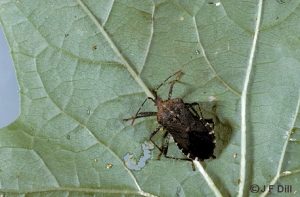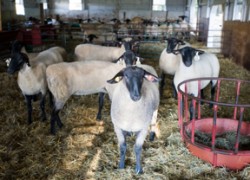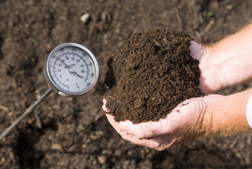Farm Scoop — June 2013
Pest Management & Your Farm
 Below are three sources of information that you may find helpful this growing season:
Below are three sources of information that you may find helpful this growing season:
1. UMaine Extension Pest Management Office, 491 College Avenue, Orono, ME 04473. You may submit disease or insect specimens for identification or diagnosis by sending them directly to the Insect & Plant Disease Diagnostic Lab (directions for submitting plant samples; directions for submitting insect samples). Or you may send digital images to clay.kirby@maine.edu (insects) or bruce.watt@maine.edu (plant diseases). There is no fee for submitting specimens.
2. Dr. Eric Sideman, Organic Crops Specialist for the Maine Organic Farmers and Gardeners Association, writes regular pest reports during the growing season. These reports are useful to organic or conventional vegetable or fruit growers. Sign up to receive Sideman’s pest reports via e-mail.
3. Entomologist Alan Eaton, University of New Hampshire Extension, offers an informative electronic IPM newsletter for fruit and vegetable growers. It is free. Subscribe to the newsletter. In addition, you may want to visit the University of New Hampshire Extension IPM website.
Keeping a Log of Pesticide Use
Keep track of the pesticides you use on your farm and when they are used. Pesticide log books are available from UMaine Extension’s Pest Management Office for $3.00 each. Send check, made payable to University of Maine Cooperative Extension, to Pesticide Log Book, Pest Management Office, 491 College Avenue, Orono, ME 04473.
Know Your Veterinarian(s)
Every livestock producer ought to have a veterinarian with whom they work. If you don’t have a veterinarian, you can find one through the Maine Veterinary Medical Association. A list of large animal vets is available on UMaine Extension website.
You may have a need for the Maine State Veterinarian. She is Dr. Michele Walsh. Dr. Walsh is located in Augusta. Her phone numbers are 207.287.7615 and 207.215.6727. Her e-mail address is michele.walsh@maine.gov.
In addition, Dr. Anne Lichtenwalner is UMaine Extension’s Veterinarian. She directs the Animal Health & Diagnostic Lab in Orono. Dr. Lictenwalner’s phone number is 207.581.2789. Her e-mail address is anne.lichtenwalner@maine.edu.
UMaine Extension Offers Workshops for Sheep and Goat Producers
 University of Maine Cooperative Extension is offering FAMACHA workshops this spring for sheep and goat producers interested in learning more about an internal parasite of small ruminants. The practical workshops will show producers how to determine the degree of infection from the barber pole worm (Haemonchus contorutus) by observing the blood color of the capillaries around the eyes of sheep or goats.
University of Maine Cooperative Extension is offering FAMACHA workshops this spring for sheep and goat producers interested in learning more about an internal parasite of small ruminants. The practical workshops will show producers how to determine the degree of infection from the barber pole worm (Haemonchus contorutus) by observing the blood color of the capillaries around the eyes of sheep or goats.
Participants will receive an information packet and record sheets. The workshop fee is $20 per farm.
The two-hour workshops are offered at two locations:
- Saturday, June 1, 2013, 11 a.m. – 1 p.m., Maine Fiber Frolic on the Windsor Fairgrounds, Windsor, Maine
- Saturday, June 15, 2013, 11 a.m. – 1 p.m., MOFGA Farm & Homestead Day, Unity, Maine
When sheep and goat producers learn the FAMACHA technique and apply it to their livestock, they are apt to have a more productive herd. They also save on deworming because of this targeted approach and select those animals for breeding that are resistant.
For more information or to request disability accommodations, call 207.781.6099 or 1.800.287.1471 (in Maine only).
USDA Offers Farm Loans for Beginning Farmers & Socially Disadvantaged Groups
Maine State USDA Farm Service Agency (FSA) State Executive Director Don Todd III reminds producers that FSA offers specially-targeted farm ownership and farm operating loans to Beginning Farmer (BF) and Socially Disadvantaged (SDA) applicants. “Farming and ranching is a capital intensive business and FSA is committed to helping producers start and maintain their agricultural operations said SED Todd.” To date, in fiscal year 2013, Maine FSA has obligated $1.9 million in direct and guaranteed loans to beginning farmers and socially disadvantaged producers.
FSA defines Beginning Farmers as those who have not operated a farm or ranch for more than 10 years, do not own a farm or ranch greater than 30 percent of the median size farm in the county if applying for a farm ownership loan, and who substantially participate in the operation of the farm. It defines Socially Disadvantaged applicants as a group whose members have been subjected to racial, ethnic or gender prejudice because of their identity as members of the group without regard to their individual qualities. These groups consist of: American Indians and Alaskan Natives, Asians, Blacks or African Americans, Native Hawaiians or other Pacific Islanders, Hispanics, and women.
For more information, call 207.753.9400, Ext 2, or e-mail Marcia Hall at marcia.hall.me.usda.gov.
Maine Compost School Workshops
 The Maine Compost Team and University of Maine are hosting several compost workshops this summer. All of the workshops have been accepted for CCA credits. The following is a list of workshops:
The Maine Compost Team and University of Maine are hosting several compost workshops this summer. All of the workshops have been accepted for CCA credits. The following is a list of workshops:
- June 17-21: Maine Compost School
- June 25: Writing Compost Management Plans; 5 CCA credits and 5 Maine Nutrient management (MNM) credits
- August 21 & 22: Food Waste Management Compost and Anaerobic Digestion; 10 CCA credits and 8 MNM credits
- August 23: Food Waste Management Tour. Coach bus with lunch; 4 CCA credits and 4 MNM credits
USDA Announces Farm Payments Scheduled to Resume — MILC, SURE, and NAP will restart on May 8
Administrator Juan M. Garcia announced today that farm payments, which had been temporarily suspended due to sequestration, are scheduled to resume May 8. This includes payments for the 2011 Supplemental Revenue Assistance Payments Program (SURE), the Noninsured Crop Assistance Program (NAP) and the Milk Income Loss Contract Program (MILC).
Producers should be advised that program sign-up periods currently underway have the following enrollment deadlines: 2013 Average Crop Revenue Election (ACRE) Program – June 3; 2011 SURE – June 7; and the 2013 Direct and Counter-Cyclical Program – August 2. Producers should contact their local Farm Service Agency office as soon as possible for appointments to enroll in these programs before the deadlines. For more information on MILC and other FSA programs, visit a local FSA service center or www.fsa.usda.gov.
USDA Announces Conservation Reserve Program Sign-Up Release
CED Marcia Hall would like to remind farmers and ranchers that the U.S. Department of Agriculture (USDA) will conduct a four-week Conservation Reserve Program (CRP) general sign-up beginning May 20 and ending on June 14. Marcia Hall also announced the restart of sign-up for continuous CRP, including the Conservation Reserve Enhancement Program, State Acres for Wildlife Enhancement Initiative, the Highly Erodible Land Initiative, the Grassland Restoration Initiative, the Pollinator Habitat Initiative, and other related initiatives.
Producers are also encouraged to look into CRP’s other enrollment opportunities offered on a continuous, non-competitive basis. USDA provides participants with rental payments and cost-share assistance. Contract duration is between 10 and 15 years.
For more information on CRP and other FSA programs, visit a local FSA service center or www.fsa.usda.gov.
